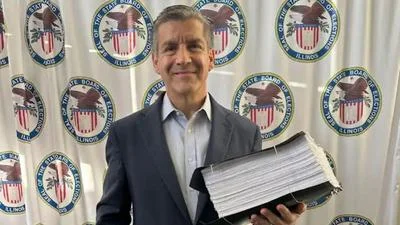Contributed photo
Contributed photo
Susana Mendoza’s election to state comptroller has many concerned with regard to her affiliation with House Speaker Michael Madigan (D-Chicago), how she will work with Gov. Bruce Rauner and how she will handle the state’s bill payments.
Jim Nowlan -- a former state legislator, agency director and aide to three governors – spoke to several Democratic Party insiders and speculated that a Mendoza-Madigan alliance may be awkward for Rauner.
“I am speculating that a comptroller of the party opposite of Gov. Rauner might be interested in making Rauner look bad or put him in an awkward position by virtue of the comptroller’s control over the paying of bills in a context in which there are more bills than there is more revenue,” Nowlan told the Sangamon Sun.
On Nov. 8, Mendoza defeated GOP incumbent Leslie Geissler Munger, winning 49.14 percent of the vote.
Mendoza once seconded a motion for Madigan to remain speaker of the House for another term when she held Chicago's 1st District state House seat, and many have speculated that Madigan heavily sponsored Mendoza's comptroller bid.
Nowlan said that, based on this speculation, a Mendoza-Madigan alliance may initiate actions that are contrary to what Munger has been doing.
“Certain bills are paid and other bills were not paid, and they are done so for reasons, in the case of Munger, that were helpful to Rauner, which is understandable because they are close allies – Rauner appointed her – and conversely, I think, a Democratic comptroller who is close to the speaker…would maybe be more interested in taking actions that would put Rauner in an awkward position,” Nowlan said. “Just the opposite of what Munger has done.”
Nowlan cogitated that Mendoza could start paying bills without regard to Rauner’s priorities. Such a situation could lead to a crisis.
“I’m just saying it’s not impossible for the comptroller to create or suggest that she would create the equivalent of a crisis by putting the state into a position where it could not pay a bill that it is imperative the state pays,” Nowlan said. “In other words, in my example, a bond payment. If the state defaulted on a bond payment, there would be great shouts of distress from Wall Street and from bond holders.”
If the state fails to make a critical payment, it may force Rauner and Madigan to sit down and compromise, Nowlan said. This may be beneficial, as the state is still without a proper budget, and neither side has budged on finding a solution.
“Clearly, Madigan will let hell freeze over before he cries 'uncle' to Rauner, and Rauner will apparently withhold any support for a budget, absent some elements of his Turnaround Agenda,” Nowlan said. “The impasse will continue unless something outside the world of Rauner and Madigan forces an action. Whether this will happen from the comptroller’s actions or not is not certain. I’m just speculating that something could transpire that would force action.”
Nowlan said that if neither side conceded to the other, the state may go without a budget until 2019, after the 2018 elections, which would be detrimental to businesses and to education.
“Any business executive who went to his board and said he plans to invest billions of dollars and generate thousands of jobs in Illinois right now would be laughed out of the boardroom by his board members because nobody knows what the future tax structure and rates are going to be and nobody knows how effectively the state will address its pension obligation and the $13 billion or so in unpaid bills,” Nowlan said. “I think the instability and uncertainty are doing great damage to the state.”






 Alerts Sign-up
Alerts Sign-up